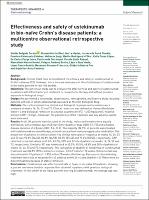Effectiveness and safety of ustekinumab in bio-naïve Crohn’s disease patients: a multicentre observational retrospective study
Author
Date
2023Permanent link
https://hdl.handle.net/11351/9913DOI
10.1177/17562848231153560
ISSN
1756-2848
WOS
000928764100001
PMID
36777363
Abstract
Background:
Clinical trials have demonstrated the efficacy and safety of ustekinumab in Crohn’s disease (CD). However, more data are necessary on the effectiveness of ustekinumab in bio-naïve patients in real-life studies.
Objectives:
The aim of our study was to evaluate the effectiveness and safety of ustekinumab in patients with CD refractory or intolerant to conventional therapy and without previous exposure to biological drugs.
Design:
We performed a nationwide, observational, retrospective, multicentre study including patients with CD, in which ustekinumab was used as the first biological drug.
Methods:
The corticosteroid-free clinical and biological response and remission were analysed at weeks 16, 24, 52 and 72. Clinical remission was defined as Harvey–Bradshaw index ⩽ 4 and biological remission as a faecal calprotectin (FC) <250 mg/g and C-reactive protein (CRP) <5 mg/L. Moreover, the persistence of the treatment and any adverse events were assessed.
Results:
In all, 84 patients were included in the study, males and females were equally distributed, with a median age of 63 years [interquartile range (IQR): 51–75] and a median disease duration of 6.8 years [IQR: 3.6–17.0]. The majority (86.9%) of patients were treated with ustekinumab as monotherapy, without concomitant immunosuppressive medication. The proportion of patients in corticosteroid-free clinical remission or response at weeks 16, 24, 52 and 72 was 93.3% (56/60), 86.8% (46/53), 82.2% (37/45) and 71.4% (30/42), respectively. CRP returned to normal values in 47.6%, 43.2%, 50% and 52.4% of patients at weeks 16, 24, 52 and 72, respectively. Similarly, FC was normalized in 45.5%, 45.5%, 48.6% and 50% of patients at weeks 16, 24, 52 and 72, respectively. The cumulative probability of remaining on ustekinumab treatment was 84.8% (95% confidence interval: 73.3–91.6) after 72 weeks. Ustekinumab was discontinued in 10 patients (11.9%) within 72 weeks of follow-up. Reasons for discontinuing treatment were lack of response (n = 4), adverse events (n = 4) and death (n = 2). There were no discontinuations because of stable remission.
Conclusions:
Ustekinumab was effective and safe in Spanish bio-naïve CD patients, showing a quicker and more durable response than obtained in patients with previous biological treatment. In this cohort of bio-naïve patients starting on ustekinumab, the average age was high.
Keywords
Crohn’s disease; Biological therapy; EffectivenessBibliographic citation
Valdés Delgado T, Olmedo Martín R, Iborra M, Herrera de Guisé C, Fuentes-Valenzuela E, Melcarne L, et al. Effectiveness and safety of ustekinumab in bio-naïve Crohn’s disease patients: a multicentre observational retrospective study. Therap Adv Gastroenterol. 2023;16:1–13.
Audience
Professionals
This item appears in following collections
- HVH - Articles científics [4476]
The following license files are associated with this item:

 Private area
Private area Contact Us
Contact Us








